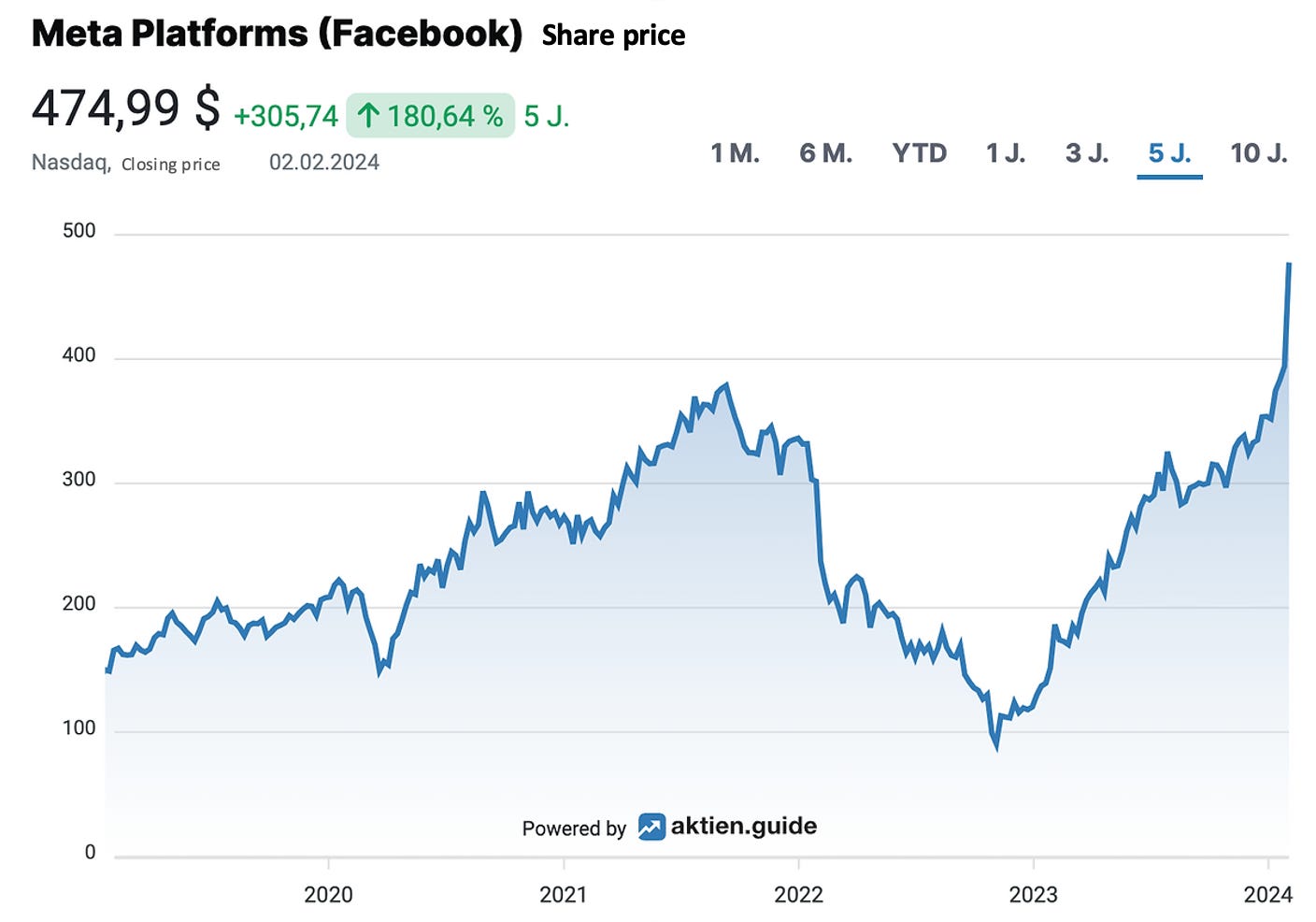What a coup by Mark Zuckerberg!
On the occasion of the presentation of excellent quarterly figures for Q4 2023, he surprisingly announced his intention to pay META 0.00%↑ shareholders - and himself - a dividend for the first time.
Investors celebrated the start of Meta's dividend payments with a 20% jump in Meta Platforms' share price on announcement day.
In future, there will be a dividend of 50 cents per share per quarter. With 2.5 billion Meta shares outstanding, this represents a dividend payout of 5 billion USD per year.
In the context of a share buyback program that has just been increased by 50 billion USD, the amount of the dividend is not particularly exciting. The dividend yield is likely to be a rather symbolic 0.4%.
Nevertheless, the dividend payment was THE story in the market reporting on Meta's quarterly results. The company's other good news nearly got lost in the shuffle:
Meta Platforms' quarterly revenues in Q4 increased by almost 25%, following a decline in revenues in the same quarter last year.
The EBIT margin doubled to over 40%.
Revenue guidance for the current Q1 2024 was more than 5% ahead of analyst expectations.
Such an outperformance is unusual for a company of this size.
If you want to know more about Meta's quarterly results, I recommend reading Brad Freeman aka "Stockmarketnerd"'s good summary here.
Why is the meta dividend so important?
For the first time, the dividend makes Meta shares attractive to a whole new group of investors:
Due to their investment strategy, many fund managers are only allowed to invest in dividend-paying companies.
The dividend payment makes Meta shares a serious candidate for inclusion in the Dow Jones Index.
And many private investors with a dividend strategy focus only on companies that pay increasing dividends every year anyway.
Is the dividend really a reason to cheer?
I'm not so sure.
A growth company should find more than enough opportunities to reinvest its cash flows in growing the business at high returns. High share buybacks and now dividend payments mean that Mark Zuckerberg no longer sees himself as being able to invest cash flows more productively in growth - either internally or through acquisitions.
And indeed, Meta has often been spectacularly wrong with its investments in recent years. It is good that Mark Zuckerberg has now realized that his investment in the Metaverse, for example, was completely overdone.
He has learnt from his mistakes, cut costs (it is often forgotten that 25% of the workforce had to go) and the result is now clearly reflected in the figures.
Two decades after its launch, Meta Platforms is now a mature company, focused at least as much on profitability as it is on vision. At the same time, it is consolidating the social media market - thanks to the involuntary support of Elon Musk.
Mark Zuckerberg has probably realized that growth rates above 20% (as usual until 2022) are no longer achievable in the medium and long term. Investors should not be fooled by the 25% growth in Q4. This growth was also driven by extremely weak comparables from the previous year.
By the way, Alphabet and Amazon are in a very similar situation. I could easily see these being the next big tech companies to start paying dividends within the next 1-2 years.
However, these tech giants can no longer be true growth companies with sales growth of more than 15% over the long term. The sheer size of these companies argues against this.
This is not bad news in itself, but a normal part of the life cycle of any successful company. The growth of these former hyper-growth companies flattens out, they mutate into cash machines and ultimately their shares turn into value stocks, which ideally also provide dividend hunters with a great deal of pleasure for many years to come.
Mark Zuckerberg has now started to follow this path, and it makes a lot of sense.
What about the valuation?
I recently named Meta as the most promising stock among the Magnificent Seven alongside Alphabet (read about it here).
The short-term premium of 20% has not changed this. With a cash flow multiple of 27, Meta is now fairly valued. The EV/sales ratio of 9 is justified by the high profitability. I don't see any significant overvaluation, as is the case with Apple, Nvidia or Tesla (see my bearish view on them here).
And I wouldn't disagree with the analysts who see high potential for further profit growth at Meta:
Even at the elevated price level, Meta is a stock that I believe will rise by 15% p.a. over the next few years. However, the risk of a setback is now much higher. Should sentiment towards big tech change, Meta shares could also come under pressure.
Unfortunately, I personally missed the (re-)entry so far. But that's OK, you can't be at every party. If you would like to follow meta-platforms and big tech with me in the future, you can
*Disclaimer:
The author and/or associated persons or companies do not own shares in Meta. This article is an expression of opinion and does not constitute any investment or financial advice.








Thank you for the article. If I remember correctly, you sold Meta in the Wikifolio back then, because you did not like the culture or the direction of the company, although you still saw Meta as a future value stock. Has your opinion on the culture or direction of the company changed in the meantime?